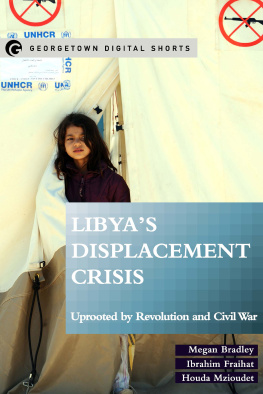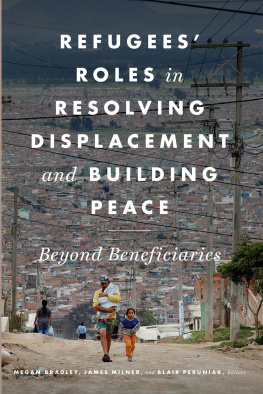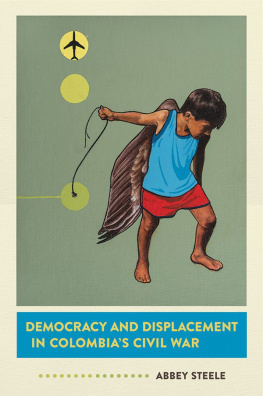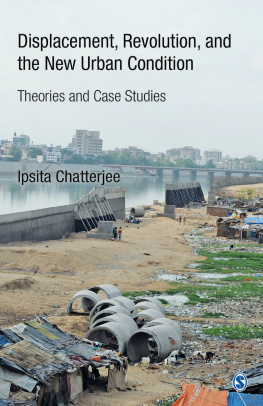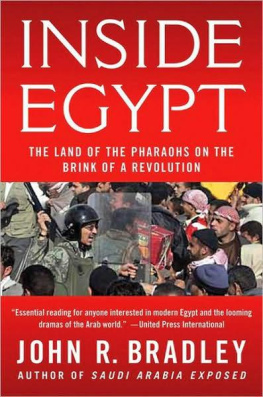Libyas Displacement Crisis
Uprooted by Revolution and Civil War
Related Titles
The African Renaissance and the Afro-Arab Spring: A Season of Rebirth?
edited by Charles Villa-Vicencio, Erik Doxtader, and Ebrahim Moosa
Driven from Home: Protecting the Rights of Forced Migrants
edited by David Hollenbach, SJ
Tunisian Revolutions: Reflections on Seas, Coasts, and Interiors
by Julia Clancy-Smith
Libyas Displacement Crisis
Uprooted by Revolution and Civil War
Megan Bradley, Ibrahim Fraihat, and Houda Mzioudet
2016 Georgetown University Press. All rights reserved. No part of this book may be reproduced or utilized in any form or by any means, electronic or mechanical, including photocopying and recording, or by any information storage and retrieval system, without permission in writing from the publisher.
Join our mailing list and get updates on new releases and special offers from Georgetown University Press.
Library of Congress Cataloging-in-Publication Data
Bradley, Megan, 1980-author.
Libyas displacement crisis : uprooted by revolution and civil war / Megan Bradley, Ibrahim Fraihat, and Houda Mzioudet.
pages cm
Includes bibliographical references and index.
ISBN 978-1-62616-329-4 (pbk. : alk. paper) -- ISBN 978-1-62616-330-0 (ebook)
1. RefugeesLibya.2. LibyaHistoryCivil War, 2011Refugees. I. Fraihat, Ibrahim, author II. Mzioudet, Houda, author III. Title.
HV640.5.L48B73 2016
961.205dc23
2015034373
This book is printed on acid-free paper meeting the requirements of the American National Standard for Permanence in Paper for Printed Library Materials.
17 16 9 8 7 6 5 4 3 2 First printing
Printed in the United States of America
Cover design by Pam Pease
Cover image by Dominique Faget / AFP / Getty Images
Contents
Acknowledgments
WE WOULD LIKE to thank all those who supported the completion of this study, including colleagues with the Foreign Policy Program at the Brookings Institution, the Brookings Doha Center, Tunisians and Libyans who shared their perspectives, and others who supported the logistics of the field research in both Libya and Tunisia. We would also like to express our appreciation for the support of the Brookings Institution Foreign Policy Directors Strategic Initiative Fund.
Introduction
LIBYANS ARE NO STRANGERS to displacement and dispossession. Muammar Gaddafis forty-two-year rule was marked by the flight of thousands of Libyans into exile, the appropriation of opponents homes and lands, and the manipulation of relations between tribes, leading to property disputes and sometimes violent conflicts. Yet, the scale of the displacement crisis engendered by the countrys 2011 revolution was unprecedented: Out of a population of 6.2 million, 550,000 people were uprooted within the country, while approximately 660,000 sought shelter in neighboring countries, alongside some 670,000 migrants who had been working in Libya before fleeing the erupting conflict. Through a combination of timely humanitarian interventions and the ability of displaced Libyans to draw on their own social and financial resources, the lions share of the crisis was swiftly resolved, with the majority returning to their homes after the fall of the Gaddafi regime.
However, several complex displacement situations have persisted within Libya while new forced migration crises have emerged. The surge in violence during the summer of 2014 led to what Tarek Mitri, the former special representative of the United Nations (UN) secretary-general for Libya, termed another unprecedented movement of population, with at least a hundred thousand more people internally displaced by the fighting. Although there is significant diversity among those who have been uprooted, many among the more long-standing displaced population are assumed to have been supporters or beneficiaries of the Gaddafi regime. Most were not complicit in human rights abuses, but these exiles nonetheless live in fear of being forcibly returned to Libya, where, in the absence of security, rule of law, and a functional transitional justice process, they may face incarceration, torture, and death.
The continued displacement of Libyan citizens within and outside their country has significant political, socioeconomic, humanitarian, and human rights implications, not only for the displaced themselves, but also for the Libyan state, its neighbors, and the international community. The aim of this book is to analyze the complex dimensions and implications of the Libyan displacement situation. While the resolution of this humanitarian crisis hinges on a negotiated end to the Libyan Civil War, it seeks to help lay the groundwork for this process by identifying constructive strategies to improve present assistance strategies and eventually to support durable solutions for Libyan internally displaced persons (IDPs) and exiles. Although there are sizable Libyan exile populations in several states, we focus in particular on those in Tunisia, where the greatest number of displaced Libyans are sheltered. More than four years after the collapse of the Gaddafi regime, these displacement situations are above all a reflection of the failure to establish security and political stability in postrevolution Libya and to initiate even-handed transitional justice processes that address unresolved grievances and effectively support the broader pursuit of reconciliation among individuals, tribes, and communities and with the state. Supporting durable solutions for displaced Libyans is a critical element of human rights protection in post-Gaddafi Libya and an essential investment in national and regional security, as prolonged displacement risks creating a marginalized population without access to peaceful channels to resolve grievances.
In addition to establishing security and strengthening Libyas enfeebled judiciary, resolving Libyas displacement crises will require the active engagement of uprooted Libyans in revived transitional justice and reconciliation processes. These processes must focus on individual rather than communal responsibility for atrocitiesparticularly as the overwhelming majority of IDPs and those in exile did not actively participate in human rights violations. They will need to strike an elusive balance between upholding accountability for past violations and avoiding the perception of victors justice. This will require that transitional justice and reconciliation efforts address crimes committed not only during the Gaddafi regime, but also in the course of the revolution and the subsequent civil war. Such an undertaking is complicated not only by the fracturing of the Libyan state in the context of the present civil war and the lack of state capacity to enforce law and order, but also by Libyas legal framework, which includes laws that immunize from prosecution those who may have committed war crimes or human rights violations if these acts were made necessary by the 17 February Revolution. In Libya and its neighboring states, strengthened policy frameworks and support for their effective implementation are needed to ensure systematic, rights-based responses to both internal and cross-border displacement, building on the incorporation of the right to seek asylum and the prohibition of the extradition of political refugees in the new Tunisian constitution. Until the security conditions in Libya stabilize, increased international engagement and support is needed to ensure that Libyas neighbors keep their borders open and can continue to shelter new arrivals.


